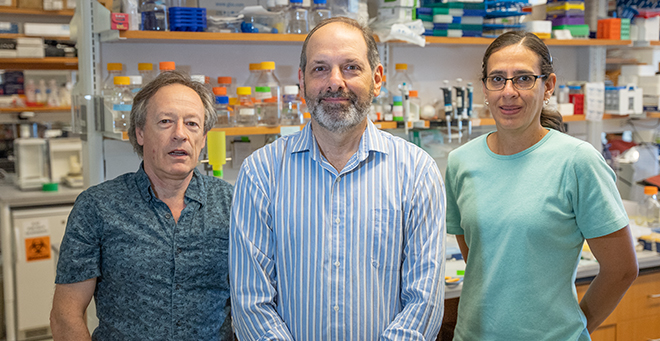
Lawrence Stern, PhD, (center) and members of his lab, Aniuska Becerra-Artiles (right) and J. Mauricio Calvo-Calle, PhD, (left) examine the antigens on the virus that causes COVID-19 in a new paper in Cell Reports.
A new paper from the laboratory of Lawrence Stern, PhD, indicates that some of the antigens on the virus that causes COVID-19 are common across all the human coronaviruses, such as those that cause the common cold, and that one particular peptide in the virus spike protein is among the most common antigens that promote an immune response worldwide.
The research appears in the June issue of Cell Reports, and was done principally by Aniuska Becerra-Artiles, a senior research scientist in the Department of Pathology and J. Mauricio Calvo-Calle, PhD, instructor in pathology, with collaborators in the Departments of Biochemistry & Molecular Biotechnology and Medicine.
“From the earliest studies of T cell response to SARS-CoV-2 (the virus that causes COVID-19) there has been intense interest in whether pre-infection immunity to circulating ‘common-cold’ seasonal coronaviruses impacts COVID-19 incidence or progression,” said Dr. Stern, professor of pathology. “In this study, we isolated T cells from volunteers who had not been exposed to SARS-CoV-2 and from volunteers who had had COVID-19 to find T cells that recognized antigens from both SARS-CoV-2 and seasonal coronaviruses. We found that one particular peptide sequence from the spike protein was particularly prominent in causing T cell response.”
Importantly, the identified sequence includes a well-known cleavage site that is a key part of the mechanism by which viruses invade cells, one that is highly conserved across human and animal coronaviruses. In fact, the sequence is presented to the immune system by the most common antigen-presenting molecule variant worldwide, which helps account for the high prevalence of reactivity, which was observed in most donors tested.
“The highly conserved sequence we identified in this study will be useful in evaluating the role of prior seasonal coronavirus exposure in COVID-19,” said Stern, “and it represents a promising candidate for inclusion in pan-coronavirus vaccine strategies designed to protect against SARS-CoV-2, particularly as it continues to evolve in the human population.”